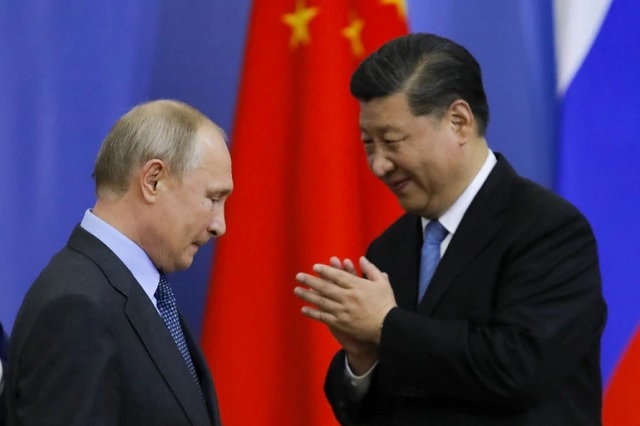
America’s opportunities and main challenge as it seeks to contain China from dominating Asia
THE LAST WORD | ANDREW M MWENDA | In the April 17th column (see: “Aiding the enemy: How US involvement in the Russia-Ukraine conflict is helping the rise of China to surpass America as the world’s leading power”, I argued that America’s core interest lies in Asia, not Europe and that Washington needs to be thinking more about how to contain China, not about fighting Russia in Ukraine.
Many readers told me the column was incomplete; that I did not explain the opportunities for America in Asia.
Washington can contain China because it is strategically better located. China has 14 neighbours on land, eight on sea. It has territorial disputes with some of them. Four of them (India, Pakistan Russia and North Korea) are nuclear armed and some of them, like Japan, can acquire nuclear weapons at very short notice. Some are potential failed states (Pakistan and North Korea) while some are powerful nations (Russia, Indonesia, Philippines, India and Japan – world’s 3rd largest economy).
Now compare this with America’s strategic position: no great powers nearby, no nuclear powers in the neighbourhood, and only two neighbours who share a border with it (Canada and Mexico) both of whom have very good relations with America.
So, anyone looking at a map would see that there is a lot of potential for Washington to build a balancing coalition in East Asia. It also means that if China seeks hegemony in East Asia, it would not find it easy.
As China’s power grows, as it acquires military capabilities that threaten its neighbours and as it begins to throw its weight around, its neighbours will seek to balance against it.
They could seek neutrality or to bandwagon with China. But this would mean accepting a position of permanent subordination and trusting in China’s indefinite benevolence. So, as long as opportunities to ally are available, we should expect balancing as the most likely option.
That is what is happening today. There is increasing strategic cooperation between the USA and India. America has restored military-to-military ties with Indonesia. The Philippines has allowed USA to use its military bases for the first time in 25 years. Washington has backed South Korea in its disputes with North Korea. It has sided with Japan over the Senkuku islands.
Therefore, China’s efforts to establish hegemony in East Asia will be resisted by the USA with the help of China’s neighbours, an advantage China does not have in the Western Hemisphere.
But there remain features in America’s balancing coalitions that are worrisome, suggesting that managing the alliances will be difficult. The first is the problem of collective action that bedevils all alliances. All countries in the alliance must share a common interest in containing China. But all have the incentive to buck-pass the work of containing China by letting others bear the burden. This leads alliance members to posture at each other, bluffing and bargaining. So alliance cohesion is very difficult.
Secondly the alliance network in Asia covers a huge territory. The Cold War NATO-coalition covered a short geographical distance – from Paris to Bonn is 400km. But New Delhi and Taiwan are 4,800km apart, Canberra to Taiwan is 7,200km, Tokyo to Singapore is over 4,200km. And some alliance members are separated from each other by large bodies of water. This means that pressure or an attack on one may not be felt as a direct threat by the other.
Assuming China attacked Taiwan; how would Australia or India feel and would they feel compelled to respond? This gives China an opportunity to play a divide and dominate strategy by making it hard for the different members of the coalition to aid one another in crisis.
The third problem is that the security environment in Asia, unlike in NATO, is not well institutionalised. Different countries in Asia don’t agree on the need for strong institutions. And few countries in Asia have commitments to each other. Instead they have mutual security treaties with the USA. And there are historical resentments among Asian countries that make it difficult to sustain a solid and workable coalition.
Also, European members of NATO and the USA traded a lot with each other and not with the USSR and its Warsaw Pact allies. Most of U.S. allies in Asia have deep economic ties with China. So as China has grown, their trade ties with it have tended to deepen. China is their leading trade partner. This may need to alter their strategic calculations and make a trade off between their security needs and their economic and trade interests. So meeting security obligations may come with huge economic costs.
These challenges require strong and adroit alliance leadership yet Washington is distracted by the Ukraine war and finding difficulty focusing on Asia.
So while ingredients of a strong balancing coalition remain, there is no guarantee it will achieve sufficient cohesion to succeed on core tasks. Remember the issue is not how those alliances perform now but how they will perform ten, twenty or forty years from today.
There are counter arguments to what I am saying here. One could say that this is old fashioned geo politics, that the nuclear revolution makes a war between China and America less likely, and encourages them to be careful. But they may indulge in proxy wars, like USA did with the USSR. And, as the current war in Ukraine suggests, big powers can make stupid mistakes.
Also, the USA and China are interdependent with strong common interests in economic cooperation and many shared interests such as on climate change, terrorism etc. This, many analysts suggest, will dampen potential rivalry. But England and Germany were the leading trade partners in 1913; so was the USA and UK in the 19th century.
The U.S. may socialise China by bringing it into the existing international institutions. But as China grows stronger it may want to change those institutions to conform with its values and interests – not those of the U.S. and her western allies. The USA and USSR cooperated on nuclear non-proliferation but that did not stop their rivalry.
Finally, U.S. – China rivalry would be disastrous for both. Therefore, all need far-sighted leadership. But how can we be sure that both will always have prudent, far sighted leaders all the time? What if one gets a short-sighted leader (Joe Biden) or bellicose, xenophobic and impulsive leader like Donald Trump?
*****
amwenda@independent.co.ug
 The Independent Uganda: You get the Truth we Pay the Price
The Independent Uganda: You get the Truth we Pay the Price



1.I believe that USA’s policies and strategies most times mean well;In the area of security and war;USA has the best training institutions like the USA military Academy,USA Navy Academy and USA Air Academy .
2.All top Army Generals in the world have trained in USA’s Academies including those from China and Japan.
3.Russian always pretends that they don’t need USA ‘s help but they always pay lots of money for double agents to infiltrate USA ‘s security system but they have discovered that Americans are too patriotic when it comes to the safeguarding the security of their country.
4.China’s rise might be temporary.Have you ever heard that China has cancelled any debts that the poor counties owes her?USA always donates to charity and the main Economic Monitoring firms like World Bank,IDF,IMF at times lend money to poor nations at a low interest rates and debt cancellations are frequent unlike China which even confiscates poor nations property incase they default on their loan repayment.
5.Britain and Germany are a little bit classy when it comes to conflict resolution i suspect at times they hide behind USA because she is proud and loud.
6.I doubt whether USA and Britain are afraid of China and Japan when it comes to trade;Those of u who drive Range Rovers or Mercedes benz will note that our cars have sensors that alert us in case we hit a pothole or drive on grass what does this mean USA and Britain do not compromise on quality .Acar is supposed to be driven on a good road.when it comes to ICT you need to pay handsomely to use their facilities.The money that is generated from silicon valley is something else.
7.It pays alot to be USA or Britain’s friend;there are benefits like Education and safety.
8.USA has a military base in ever key water body and route because these are key routes for trade and can be misused if not well guarded.
9.USA has become wild because of the increasing power of the Arab world and the rise of terrorists which is a new but deadly organization.
10.Proxy wars are good because they control ambitious nations.
11.In Eastern Europe, Russia wants to be worshiped Britain,Germany and USA seem not to have that attitude because they have fought enough wars in the past while Russia seems to think that in this era its still fashionable to fight wars she actually looks out of place.
I wonder, who told Mwenda to write an Article advising USA on how to conduct her Geopolitical issues. I fail to see why ordinary Ugandans will interested on how USA conducts its affairs. Neither do I see , USA paying attention to Mwenda and what he has to write about the country.
Personally, I would rather Mwenda writes on problems bedevilling Uganda. There are many issues to investigate and write about this country that is sinking. e.g- (a) He wrote an article a few weeks ago critical of Pinetti [ the dubious M7 investor ] and when M7 told the country that he /M7 is the one who looked out for this con woman and gave more tax payers money to squander , Mwenda never responded. (b) why have all Government Poverty initiatives failed – Entandikwa ; Bonabagagawale; Operation Wealth Creation ; Emyoga etc…. and there is still grinding poverty in the country. (c) Where does Mwenda stand on now MPs being paid to pass supplementary budgets or anything that M7 wants passed without scrutiny (d) The never ending endemic corruption in the country that has hurt and continues to hurt the delivery of public services (e) the break down of the rule of Law in the country etc…..
MAYBE Mwenda does not want to deal with these issues because he is part of the Political eating club ?
Spot on. I couldn’t agree more.
It is classy about some Ugandans to show that are smart by discussing each and everything about US, England premier league, foreign musicians-and claim they don’t know any in Uganda-just like Mwenda did with Sheebah Karungi recently….
Uganda is fragile country and has so many problems to write about that directly affect Ugandans and Mwenda. Focusing on such issues by the likes of Mwenda can impact policy and accountability than focusing on the number one country in the world (USA) which doesn’t care about what a person from a failed and one of the poorest countries on the globe consistently writes or suggests in his magazine . Surprisingly, when it comes to Uganda, mwenda sees the main opposition (FDC and NUP) as the biggest problem to the country and hardly sees any wrong with president Museveni. This is probably because Mwenda is so much networked with current leadership of Uganda. For instance, when there is corruption or big government scandal, he mainly does PR justifying why it was good to misappropriate public resources. Those who underrated Mwenda’s extent of entrenchment such as the former presidential press secretary and media advisor, Tamale Mirundi faced the reality when Mwenda, was given 5 (five) billion Ugx to promote government and Mirundi wanted a cut